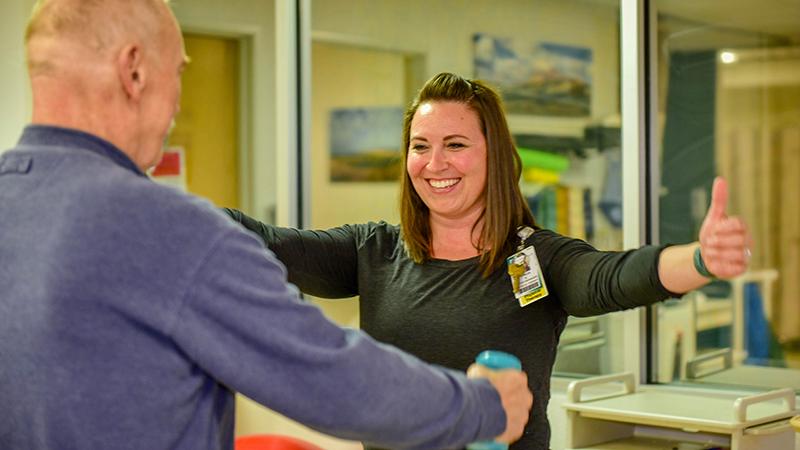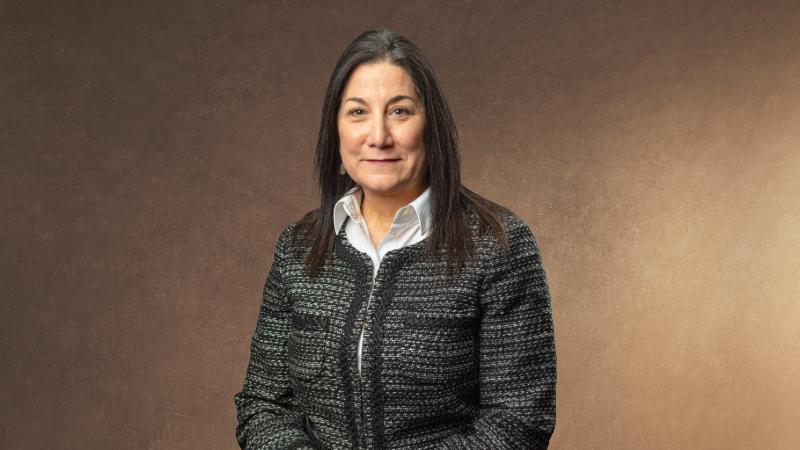
Nicole Clark, MD, FAAN
August 3, 2020
By Dr. Nicole Clark
It is estimated that 5.8 million Americans are living with Alzheimer's dementia today. This includes one in 10 people over the age of 65. We have all been impacted by the disease in some way—a parent, a favorite aunt, a neighbor; everyone knows someone who has suffered with the disease. I would like to focus today on the caregivers who bravely face the uncertainty of living with or caring for someone with Alzheimer's.
In my neurology clinic at St. Peter's Health, I see many patients from our community who are suffering with Alzheimer's. I also see their spouses and children who suffer alongside them. I often implore them to take care of themselves so they can take care of their loved ones better. This advice is not just platitudes but important perspective. Caregiver burnout is real and must be recognized in order to be prevented.
I recommend that all caregivers connect with the Alzheimer's Association (www.alz.org). Their website provides a wealth of information and excellent tips. The Alzheimer’s Association highlights 10 symptoms of caregiver stress. Knowing about these common symptoms can help people identify if caregiver burnout is imminent or a reality. Ideally, knowing the symptoms can help you identify caregiver burnout before it happens. The Alzheimer’s Association identifies the following symptoms:
- Denial about the disease and its effect on the person who has been diagnosed. I know mom is going to get better.
- Anger at the person with Alzheimer's or frustration that he or she cannot do the things that they used to be able to do. He knows how to get dressed he is just being stubborn.
- Social withdrawal from friends and activities that used to make you feel good. I do not care about visiting with the neighbors anymore.
- Anxiety about the future and facing another day. What happens when he needs more care than I can provide?
- Depression that breaks your spirit and affects your ability to cope. I just do not care anymore.
- Exhaustion that makes it nearly impossible to complete necessary daily tasks. I am too tired for this.
- Sleeplessness caused by a never-ending list of concerns. What if she wanders out of the house or falls and hurts herself?
- Irritability that leads to moodiness and triggers negative responses and actions. Leave me alone!
- Lack of concentration that makes it difficult to perform familiar tasks. I was so busy I forgot my appointment.
- Health problems that begin to take a mental and physical toll. I cannot remember the last time I felt good.
Help is available
If you are caring for someone with Alzheimer's and experience one or more of the symptoms above, please make time for you to see your own physician and consider some of these other options that can help:
- Know what community resources are available. There are adult day programs, in-home assistance, and programs through the Department of Aging that can help relieve the pressure.
- Get help and find support. There are local caregiver support groups for Alzheimer's caregivers and patients, both in person and virtual that can be found at www.alz.org under community resources.
- Use relaxation techniques such as meditation, breathing exercises, muscle relaxation, yoga, or your favorite exercise
- Find time for yourself. Respite care is vital. Take advantage of respite care before you reach the point of burnout with day programs or short-term stays or having someone come to your home.
- Become an educated caregiver. The more you know and understand, the better you will be able to cope with the changes that happen with the disease.
- Take care of yourself. Visit your doctor, eat well, exercise and get plenty of rest. If you are healthy, you will be a better caregiver.
- Make legal and financial plans. It will give you peace of mind to have power of attorney documentation and financial planning in place.
Caring for yourself will make you a more effective caregiver and improve quality of life for both you and your loved one with Alzheimer's disease. As we recognize the impact of Alzheimer's disease on our patients, we also salute and support the caregivers putting in countless hours for their loved ones. Help is available, and everyone needs help. No one can do this alone.
Dr. Nicole Clark, MD, FAAN is a neurologist at St. Peter’s Health. Dr. Clark moved to Helena from St. Lake City where she completed a fellowship in clinical neurophysiology/neuromuscular medicine at the University of Utah Health. She earned her medical degree at the University of Missouri – Columbia. She is a member of the American Academy of Neuromuscular and Electrodiagnostic Medicine, American Academy of Neurology, and American Medical Association. She is a Fellow of the American Academy of Neurology.


